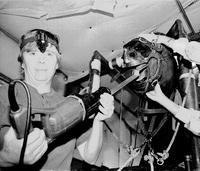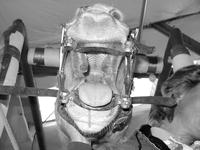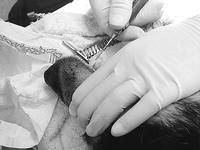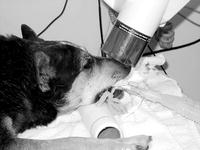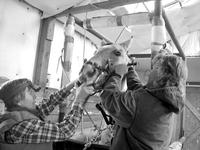|
The Sublette County Journal Volume 4, Number 12 - 11/18/99 brought to you online by Pinedale Online
Suzie Blaha expands her practice to include animal dentistry by Jennifer Binning Dog breath. It is one of the most unpleasant smells on the face of the earth, and one that dog lovers think they must simply endure. Not anymore. Boulder veterinarian Susie Blaha has discovered a previously unknown passion for animal dentistry. Twenty years ago, when Susie graduated from the highly regarded Colorado State University Veterinary College, students were taught only the basics of equine and small animal dentistry. If a horse had an uneven bite, float their teeth. If they had an abscess, pull it, but only if the owner of the animal noticed something was wrong. Small animals often suffered in silence, with no way to tell their owners they had a toothache. Susie hopes that by informing people about the signs and symptoms of periodontal disease in their animals, she will be able to improve the quality of, as well as prolong, pet's lives.
Previously, vets would correct this problem by "floating" or filing the teeth down, a lengthy and painful process for the horse and the vet. Recent advancements in equine dentistry have made this process obsolete. After attending an equine dentistry workshop in Canada three years ago, Dr. Blaha purchased a new piece of equipment she had seen up north that essentially does the work for her in seconds. It causes much less trauma to the animal as well, as the tool is much smaller than a traditional floating file.
It is unknown how many young horses have been put down or died as a result of imperfect teeth. Sometimes a colt will retain its baby teeth, which causes problems when the permanent teeth come in, often resulting in a failure to thrive, and frequently death, as the animal is unable to chew efficiently. An equine dentist can fix the problem quickly, thus saving the animal, and returning a ravenous horse to its owner. Susie had extracted a broken tooth from a horse the day before my visit to her surgery in Boulder, and when I arrived the horse was doing beautifully. Dr. Blaha showed me the extracted tooth, which had an unbelievable stench that filled the barn, noting that the horse no longer had appallingly bad breath and his runny nose had cleared up considerably overnight.
Dr. Blaha does not have much of a problem convincing dog and cat owners that their pet's teeth need care as well. "Pet owners expect the best care possible for their pets because they are a part of their family," explains Dr. Blaha. It is not uncommon for a stock dog to have broken teeth as a result of being kicked in the face by a cow. Dr. Blaha has also seen a number of dogs that have fallen out of a pickup truck and broken their canine teeth. Many dogs are given to chewing on rocks, or their owners buy them commercial cow hooves, which easily fracture their teeth. This can cause the tooth to die, and possibly fall out, leaving a hole in the gums where food may become lodged and even work its way into the sinus of the animal, which requires major surgery to correct. Pets with a gum or tooth infection are also at high risk for having blood borne bacteria attack their heart, liver, or kidneys, drastically shortening their lives.
Dr. Blaha is currently enrolled in two programs to become board certified in veterinary dentistry; a field which has very few board certified specialists. "I love this work," she says "and I want to become very skilled in this area of my practice." The programs she is enrolled in help her to stay on top of this rapidly advancing specialty and allow her to provide the highest quality care for her patients that come from all over the state. Photo credits: Jennifer Binning, Jennifer Binning, Jennifer Binning, Jennifer Binning, Jennifer Binning See The Archives for past articles. Copyright © 1999 The Sublette County Journal All rights reserved. Reproduction by any means must have permission of the Publisher. The Sublette County Journal, PO Box 3010, Pinedale, WY 82941 Phone 307-367-3713 Publisher/Editor: Rob Shaul editor@scjonline.com |
